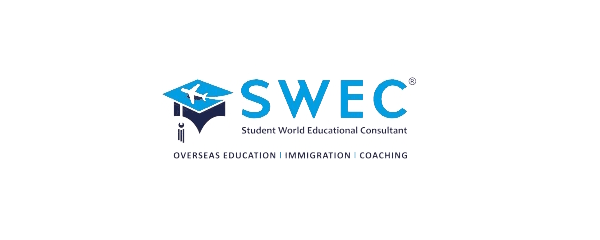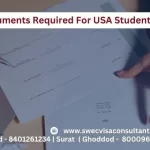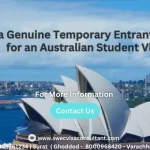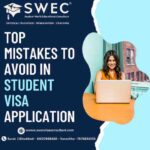Table of Contents
Introduction
The USA student visa interview is one of the most critical steps in the process of obtaining a student visa. It is during this interview that you present yourself as a genuine student who is financially stable and academically motivated to study in the United States. Proper preparation is essential to increase the likelihood of approval and avoid common mistakes that can lead to rejection.
In this blog, we will walk you through the process of preparing for your USA student visa interview, the significance of this step, and the strategies to ensure success. We’ll also provide insights into common visa types—F-1, J-1, and M-1—and what each entails.
Understanding the Importance of the Visa Interview
The visa interview is a pivotal step in your student visa application process. Here’s why it matters:
Role of the Interview in Visa Approval
Visa officers conduct interviews to verify your intentions, financial stability, and academic plans. They assess whether you are a genuine student, your ability to fund your education, and your likelihood to return to your home country after completing your studies.
How Visa Officers Assess Candidates
- Intentions: Are you genuinely pursuing higher education in the U.S., or do you have other motives?
- Financial Stability: Do you have sufficient funds to support your tuition and living expenses?
- Academic Plans: Do your academic qualifications align with the course and university you have chosen?
Common Reasons for Visa Rejection
- Insufficient Financial Proof: Failure to demonstrate how you will fund your education.
- Inconsistent Answers: Providing answers that contradict your application documents.
- Lack of Clear Intentions: Not convincingly explaining why you chose a particular program or university.
Pre-Interview Preparation
Proper preparation is the key to a successful interview. Here are the steps you need to follow:
a. Research and Documentation
Gather Necessary Documents
Before your interview, ensure you have the following documents organized and ready:
- Passport: Your passport must be valid for at least six months beyond your planned stay in the U.S.
- DS-160 Confirmation Page: This is your visa application form.
- Visa Appointment Confirmation Letter: Proof of your scheduled interview.
- I-20 or DS-2019 Form: Issued by your educational institution.
- SEVIS Fee Payment Receipt: Proof of payment for the Student and Exchange Visitor Information System (SEVIS).
- Academic Transcripts and Certificates: High school and/or college transcripts.
- Test Scores: TOEFL, IELTS, GRE, or GMAT scores, as applicable.
- Financial Documents: Bank statements, affidavits of support, or sponsorship letters.
- Proof of Ties to Your Home Country: Documents showing family, property, or job commitments in your home country.
Know Your University and Program
- Research your university and its course structure.
- Understand the program’s relevance to your career goals.
- Be prepared to explain why you chose this particular institution over others.
b. Understanding Common Questions
Types of Questions Asked
- Academic Background and Plans:
- Why did you choose this program?
- What are your future career aspirations?
- Financial Stability and Funding Sources:
- Who is funding your education?
- Do you have proof of sufficient funds to cover your tuition and living expenses?
- Ties to Your Home Country:
- What are your plans after completing your studies?
- How do you intend to utilize your education in your home country?
Tips for Answering Questions
- Be concise and specific.
- Avoid memorized answers; speak naturally but confidently.
- Ensure your answers align with the information in your application documents.
Additional Tips for a Successful Interview
- Dress Appropriately: Wear formal attire to create a positive first impression.
- Practice Mock Interviews: Simulate the interview environment with friends or mentors to build confidence.
- Maintain Positive Body Language: Smile, make eye contact, and sit upright to show confidence.
- Stay Calm Under Pressure: If you don’t know an answer, remain composed and provide an honest response.
Dressing and Presentation Tips
Your appearance and behavior create the first impression on the visa officer, making dressing and presentation essential aspects of your preparation.
1. Dress Formally and Professionally
- For Men: Wear a well-ironed shirt, formal trousers, and polished shoes. A tie or blazer adds a professional touch.
- For Women: Opt for a formal dress, saree, or salwar suit. Avoid bright colors or overly casual outfits.
2. Importance of First Impressions
Visa officers often make judgments based on how applicants present themselves:
- A neat and professional look reflects seriousness and preparedness.
- Proper grooming (clean nails, tidy hair, minimal makeup) enhances your professional image.
3. Confident Body Language
- Maintain good posture, sit upright, and avoid slouching.
- Make eye contact when speaking to the officer.
- Use subtle hand gestures to emphasize key points but avoid fidgeting.
4. Polite and Respectful Demeanor
- Begin and end the interview with a courteous greeting.
- Use polite language, and avoid interrupting the officer.
- A genuine smile can help create a positive atmosphere.
Strategies for Answering Questions
Your ability to provide clear, concise, and consistent answers is critical during the interview.
a. Common Question Categories
1. About Academics
Visa officers want to understand your academic aspirations and motivations:
- Why did you choose this university/program?
Highlight the program’s unique features, its alignment with your career goals, and why it stands out compared to other options. - What are your academic goals?
Explain how this degree will enhance your knowledge and skills in your chosen field.
2. About Finances
Financial stability is a crucial concern for visa officers:
- How will you fund your education and living expenses?
Provide detailed information about funding sources (family support, scholarships, loans, etc.). - Can you provide proof of your financial stability?
Present well-organized financial documents that demonstrate you can cover tuition, living expenses, and unforeseen costs.
3. About Intentions
Officers need assurance that you plan to return to your home country:
- What are your plans after completing your education?
Discuss your career aspirations and how the education will contribute to opportunities in your home country. - How does this program align with your career goals?
Explain how the program is essential for your professional growth and success.
b. Tips for Crafting Effective Responses
1. Keep Answers Concise and Relevant
- Avoid lengthy explanations or adding unnecessary details.
- Stick to what is asked and focus on the key points.
2. Be Honest and Consistent
- Always provide truthful responses.
- Ensure your answers align with the information in your application and supporting documents.
3. Avoid Over-Preparation
- While practicing is essential, don’t memorize answers. Speak naturally and confidently.
Mock Interviews and Practice
Mock interviews are a valuable tool to simulate the actual visa interview process, helping you prepare thoroughly.
1. Importance of Mock Interviews
- They mimic the real interview environment, helping you become familiar with the process.
- You can identify areas for improvement, such as unclear responses or nervous habits.
2. Getting Feedback
- Seek feedback from professionals, mentors, or visa consultants like SWEC Visa.
- Constructive criticism can help refine your answers and overall demeanor.
3. Practicing Responses
- Rehearse answers to common questions, focusing on clarity and confidence.
- Record yourself during practice to evaluate body language, tone, and fluency.
4. Reducing Nervousness
- Practice builds confidence, reducing anxiety on the actual interview day.
- Familiarity with the process helps you stay composed and handle unexpected questions.
Day of the Interview
a. Arriving on Time
Timeliness reflects your seriousness and preparation.
- Plan Your Route:
Research the location of the embassy or consulate and plan your route in advance.
Account for traffic, parking, or other delays to avoid last-minute stress. - Arrive Early:
Reach the venue at least 30 minutes before your scheduled time. This gives you time to go through security checks and settle your nerves.
b. What to Bring
Having all necessary documents ready is vital for a smooth interview experience.
- Checklist of Essential Documents:
- Passport (valid for at least six months beyond your intended stay).
- DS-160 confirmation page.
- Visa appointment confirmation letter.
- I-20 or DS-2019 form.
- SEVIS fee payment receipt.
- Academic transcripts, test scores, and certificates.
- Financial documents (bank statements, sponsorship letters, affidavits).
- Proof of ties to your home country (property papers, family details).
- Additional Items:
- A pen and small notebook for notes.
- A folder or organizer to keep your documents in order.
c. Maintaining Composure
Nervousness is natural, but staying calm is key to success.
- Stay Calm and Composed:
- Take deep breaths to ease anxiety.
- Avoid rushing or panicking during the process.
- Tips to Manage Interview Anxiety:
- Visualize a positive outcome.
- Practice controlled breathing techniques to reduce stress.
- Maintain a confident and approachable demeanor.
Handling Unexpected Situations
Unanticipated questions or scenarios can arise during the interview, but they can be managed effectively.
1. If You Don’t Understand a Question:
- Politely ask the officer to repeat or clarify the question:
“I’m sorry, could you please repeat that question?” - Take a moment to process your thoughts before answering.
2. Handling Tricky or Unexpected Queries:
- Stay calm and composed, even if caught off guard.
- Answer honestly and confidently, without overthinking.
- If unsure about an answer, acknowledge it gracefully:
“I will need to verify that information, but my understanding is…”
3. The Importance of Honesty:
- Always provide truthful responses.
- Avoid exaggerating or fabricating details, as visa officers are skilled at detecting inconsistencies.
After the Interview
The post-interview phase is equally significant as it determines your next steps.
1. What Happens After the Interview?
- The officer will inform you of the outcome at the end of the interview.
- You may be issued a visa approval notice or a request for additional documentation.
2. Receiving Your Visa Approval or Denial:
- If Approved:
- The officer will retain your passport for visa stamping.
- You will receive instructions on how and when to collect your passport.
- If Denied:
- You will receive a written explanation outlining the reasons for denial.
- Assess the reasons and address the concerns before reapplying.
3. Timeline for Passport and Visa Delivery:
- Passports with visas are typically delivered within 5–7 business days.
- Track your passport status online or via the consulate’s communication channels.
4. Steps to Take if Your Visa is Denied:
- Understand the specific reason(s) for rejection.
- Work with a visa consultant to strengthen your application for the next attempt.
- Reapply with additional documentation or improved responses to concerns raised.
Common Mistakes to Avoid
Many applicants inadvertently lower their chances of success by committing avoidable mistakes.
1. Being Unprepared with Documents or Answers:
- Double-check your document checklist before leaving for the interview.
- Practice answering common questions to boost confidence.
2. Providing Inconsistent Information:
- Ensure your answers match the information in your application and supporting documents.
- Recheck your application for any discrepancies before submission.
3. Overexplaining or Giving Scripted Answers:
- Avoid long-winded responses that deviate from the question.
- Be genuine and natural in your communication style.
4. Displaying a Lack of Confidence or Professionalism:
- Nervous body language, unclear speech, or hesitation can create a negative impression.
- Maintain a confident, respectful, and positive attitude throughout.
Tips for a Successful Visa Interview
Do’s and Don’ts for the Interview Day
Do’s:
- Be Prepared:
- Review your application and supporting documents thoroughly.
- Anticipate potential questions and rehearse concise, relevant answers.
- Dress Professionally:
- Wear formal attire that reflects your seriousness about the interview.
- Stay Calm and Confident:
- Approach the interview with composure.
- Maintain eye contact, and offer a firm handshake if appropriate.
- Answer Honestly:
- Provide truthful responses that align with your submitted documents.
- Showcase Your Purpose:
- Express your genuine interest in studying in the U.S.
- Explain how the program aligns with your career and academic goals.
- Carry All Necessary Documents:
- Double-check that your document folder is complete before leaving home.
Don’ts:
- Avoid Being Late:
- Arriving late can create a negative impression. Plan your schedule carefully.
- Don’t Overexplain:
- Keep answers concise and to the point to avoid confusion or unnecessary details.
- Refrain from Arguing:
- Even if a question seems challenging, respond calmly and respectfully.
- Don’t Use Slang or Informal Language:
- Maintain a professional tone throughout the interview.
Maintaining Positivity and Enthusiasm
Visa officers often assess your demeanor and intentions during the interview.
- Stay Positive:
- A positive attitude helps convey your eagerness to pursue education in the U.S.
- Smile when appropriate, and project confidence in your plans.
- Show Genuine Enthusiasm:
- Speak passionately about your chosen university, program, and career aspirations.
- Let the officer see your excitement about contributing to your field after your studies.
Conclusion
Preparing for a USA student visa interview is a multifaceted process that requires attention to detail, clarity of purpose, and a calm approach. Key takeaways include:
- Being thoroughly prepared with your documents and responses.
- Dressing professionally and maintaining a positive demeanor.
- Practicing concise and truthful answers to common interview questions.
- Staying confident and showcasing your enthusiasm for studying in the U.S.
Thorough preparation and regular practice are your greatest allies. Simulate real interview scenarios through mock sessions to reduce anxiety and refine your responses.
At SWEC Visa, we specialize in guiding students through every step of the visa process. Our expert team offers personalized support, including mock interviews and document preparation, ensuring you’re fully equipped to ace your USA student visa interview.
Consult SWEC Visa today to turn your dream of studying in the United States into reality!






